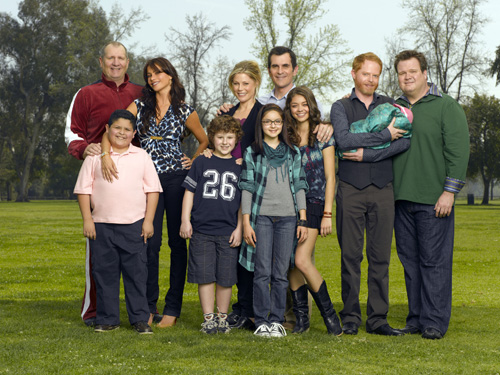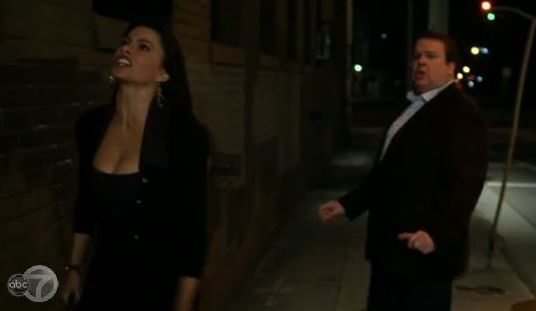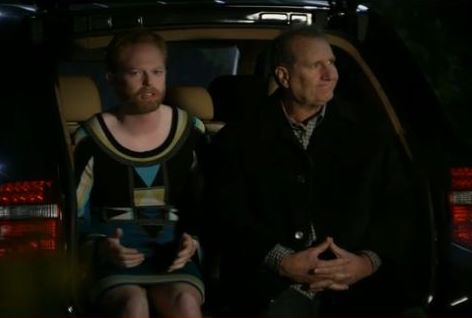A Modern Look at the American Family
In a recent episode of ABC’s new primetime hit comedy Modern Family, audiences were treated to a familiar scenario. Three of the show’s characters—Jay Pritchett, his thirty-something son, Mitchell Pritchett, and the former’s preteen stepson, Manny—go on a trip to the great outdoors for some stargazing and male bonding, but unexpected events soon lead the evening hilariously awry.
Manny, spurred on by his stepfather to befriend his new brother through wisecracks, upsets Mitchell, leading the latter to storm off into the woods. He eventually returns from his pouting, having been sprayed by a skunk. Before allowing his son to enter the car, Jay tells Mitchell that he must take off his soiled clothing. Of course, all Mitchell can find in the trunk is a dress belonging to Jay’s wife, and this only further incites Manny’s goading. Having had enough, Mitchell leaves again, only to be told by his father that Manny was only brought on the outing because the boy had experienced social rejection from his friends earlier in the week. The scene ends with Mitchell comforting Manny, and Jay informing Mitchell, with characteristic doltishness, that “if you were that type of a gay [i.e. a drag queen], you’d probably do alright for yourself.”
While the setup is a common enough, the scene’s ending—in which we see a gay, cross-dressed man advising his decades-younger stepbrother at the behest of their crotchety, politically insensitive father—is surprising, to say the least. In a television landscape that is bloated with derivative reality shows, primetime soap operas, and sci-fi dramas, Modern Family returns the sitcom to its old stomping ground of the family living room, locating there a sense of humor—and of political resonance—that is modern, indeed.
The show (which airs Wednesdays at 9 p.m.) focuses on a group of three interrelated family units who live in an unidentified suburban setting outside of Los Angeles. Claire (Julie Bowen) and Phil Dunphy (Ty Burrell) and their three children form the core of the show, while the rest of the cast comprises Claire’s brother, Mitchell Pritchett (Jesse Tyler Ferguson), with his partner, Cameron (Eric Stonestreet), as well as the siblings’ father, Jay Pritchett (Ed O’Neill), alongside his much younger Colombian wife, Gloria (Sofía Vergara). The series begins with Mitchell and Cam raising their newly adopted Vietnamese baby, Lily, while Jay helps Gloria with her precocious preteen son, Manny (Rico Rodriguez II).
Most episodes begin with an opening question having been posed to one of the characters by an off-camera interviewer, which he or she then briefly answers and around which the rest of the action is loosely organized. Many plots focus on events that affect two or more of the families, while others focus on problems internal to specific couples. Regardless of the story, however, the subtext of the show consistently expresses the difficulty in negotiating what “family” really means at a time in which the definition of that institution is undergoing a series of dramatic, controversial shifts.
Created by Frasier alums, Christopher Lloyd and Steven Levitan, Modern Family’s style is a combination of the mockumentary approach of The Office, the comedic timing of Arrested Development, and, though far less heavy-handed, the sense of sitcom social engagement made famous in the 1970 series All in the Family. In that show, many episodes featured the cantankerous patriarch Archie Bunker’s encounters with some controversial social issue (racism, sexism, etc.), with most of the laughs arising from the obviously stubborn ignorance of his opinions.
Instead of episodic topicality, however, Modern Family seems to be using its regular characters as a means by which to present, in a disarming context, a number of the more serious questions regarding what the “modern family” should or can be. Unsurprisingly, while Claire and Phil Dunphy play the typical (if parentally inept) straight, white couple, the gay and interracial/cross-generational pairings provide a great deal of the show’s laughs based on their “othered” status. However, they are also presented unapologetically and seriously as legitimate families. In this way, a socially progressive vision of the family is being smuggled into the homes (and possibly, hearts) of actual American families in the incredibly savvy guise of stereotype-based humor.
Take, for example, Cam, Mitchell and Lily. While the two daddies are by no means the most “flamboyant” of gay men, their characters still reference common gay archetypes. At first glance, Cam—portly, jolly, and motherly as he is —would seem to be a trite stereotype, while the more straight-laced, neurotic Mitchell could be read as some sort of queer apologist. However, as the stargazing episode mentioned above illustrates, the writers seem to take great pleasure in subverting these readings: in moments of threat, Cam becomes arguably the most butch character on the show, while Mitchell proves to be the more emotionally sensitive of the pair.
Furthermore, this dynamic carries over from external situations to the couple’s private relationship. In another recent episode, for example, Mitchell sadly recalls that he did not attend many “sports games” with his father (the traditionally masculine Jay) growing up, leading Cam to wryly suggest that Mitchell might have been more successful had he simply called them “games.” This refreshing play with stereotypes is certainly one of the more progressive aspects of the show, and the gay jabs that do remain seem to be more lovingly based on truth than on homophobia. Moreover (and more importantly), the validity of the men’s love for one another and for their child is never brought into question.
The situation is similar with the Colombian immigrants, Gloria and Manny. While Gloria is often articulated as a fiery, passionate Latina bombshell, she is also almost always shown to be smarter than her husband and the other white characters on the show. Her calls for revenge and ability to eat spicy food aside, Gloria is a good wife and mother, not to mention a patient stepmother-in-law to Cam, who has a penchant for ejaculating an always-popular “you people” at the most awkward moments. As it does with same-sex families, Modern Family works to affirm racially-blended families through a combination of playful ethnic humor and an unflinching commitment to the idea that an American family can include people from south of the border.
However, the show is not without its faults. Some critics have pointed out that, while the straight couples participate in a healthy amount of network-safe innuendo, the gays are noticeably sexless. They often appear at home in full-body pajamas, and shots of them in bed tend to have them spaced somewhat far from one another. One’s initial impulse here would be to claim that the network is including gay men on the condition of sexual suppression in order to make the show palatable for less accepting audiences. While this assertion seems fair, one might also read the situation as being in line with some agenda to further legitimize the couple as a family.
With a new baby in the house, many couples (straight or otherwise) lose interest in sex. At the beginning of the series, Cam explains his weight as a biological “nesting” response to the presence of the child, indicating that his new size might make him less attractive to Mitchell than he once was. One episode even features the couple in the common story of a parent (here Mitchell) having to choose between pursing a demanding career and seeing his child’s first steps. Most viewers will recognize that these are the manifestations of stress that challenge the relationships of many new parents, thereby helping them relate to the men as family members and not simply gay people. Of course, one might challenge the idea that gay people—or any marginalized group, for that matter—should be forced to conform to the notions of middle-class, white, heteronormative life in order to be seen as legitimate “family” material; however, it seems unlikely that network television would be willing to present, say, a polyamorous collective, under the Modern Family heading at present.
In the end, Modern Family and other shows like it cannot hope to be politically progressive on all fronts; yet, in being playfully aware of their own stereotypes and conventions, they do have the important opportunity to provide a space for cultural criticism, and possibly even change. The danger, as always, is that certain segments of the audience will only catch the occasional gay or racial joke; but in Modern Family, the sitcom is at least attempting to present a truthful image of the modern American family: an image that is demographically diverse, politically imperfect, and, perhaps best, deeply, consistently, and lovingly funny.





